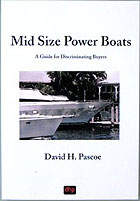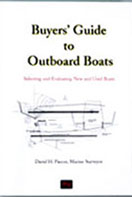-The Problem of Complacency
- Relocation
2
- Where to go?
3
- Storm Prediction
- Overcrowding
4
- Making of a Good Dock
- What About Floating Docks?
Storm Prediction Where you are located relative to where the storm makes landfall makes a huge difference. Unfortunately, this is not easy to predict more than 24 hours in advance, though the advance predictions of storm paths has been getting better. Storm path projections are issued by the Hurricane center and it's a good idea to pay attention to them. If you're going to end up on the west side of the storm, then the issue you have to deal with is low, not high water.
The illustration above shows the wind directions of Andrew as it came ashore. Since this storm made a nice, straight, steady path, it was pretty easy to figure which side of the storm you'd be on.
Rivers can also provide good security, especially if they're not the wide, funnel mouth type. If a river takes a turn parallel to the shoreline, that's probably a good bet. But check on the history of the river to make sure it's not prone to flooding from rainfall.
The photo at left depicts a sure-fire disaster in
the making, an overcrowded canal where the boats are
too close together with inadequate pilings. Tightly
packed, crowded marinas present much higher risks.
Here the reason is because narrow slips don't give
enough space to extend your dock line length to allow
the boat to rise and fall with the storm surge. Note
that none of these boats have stand-off pilings, and
the finger piers are only half the length of the boats.
When one breaks loose, it will take others with it. >> Part 4 - Making of a Good Dock









David Pascoe is a second generation marine surveyor in his family who began his surveying career at age 16 as an apprentice in 1965 as the era of wooden boats was drawing to a close.
Certified by the National Association of Marine Surveyors in 1972, he has conducted over 5,000 pre purchase surveys in addition to having conducted hundreds of boating accident investigations, including fires, sinkings, hull failures and machinery failure analysis.
Over forty years of knowledge and experience are brought to bear in following books. David Pascoe is the author of:
In addition to readers in the United States, boaters and boat industry professionals worldwide from nearly 80 countries have purchased David Pascoe's books, since introduction of his first book in 2001.
In 2012, David Pascoe has retired from marine surveying business at age 65.
On November 23rd, 2018, David Pascoe has passed away at age 71.
Biography - Long version